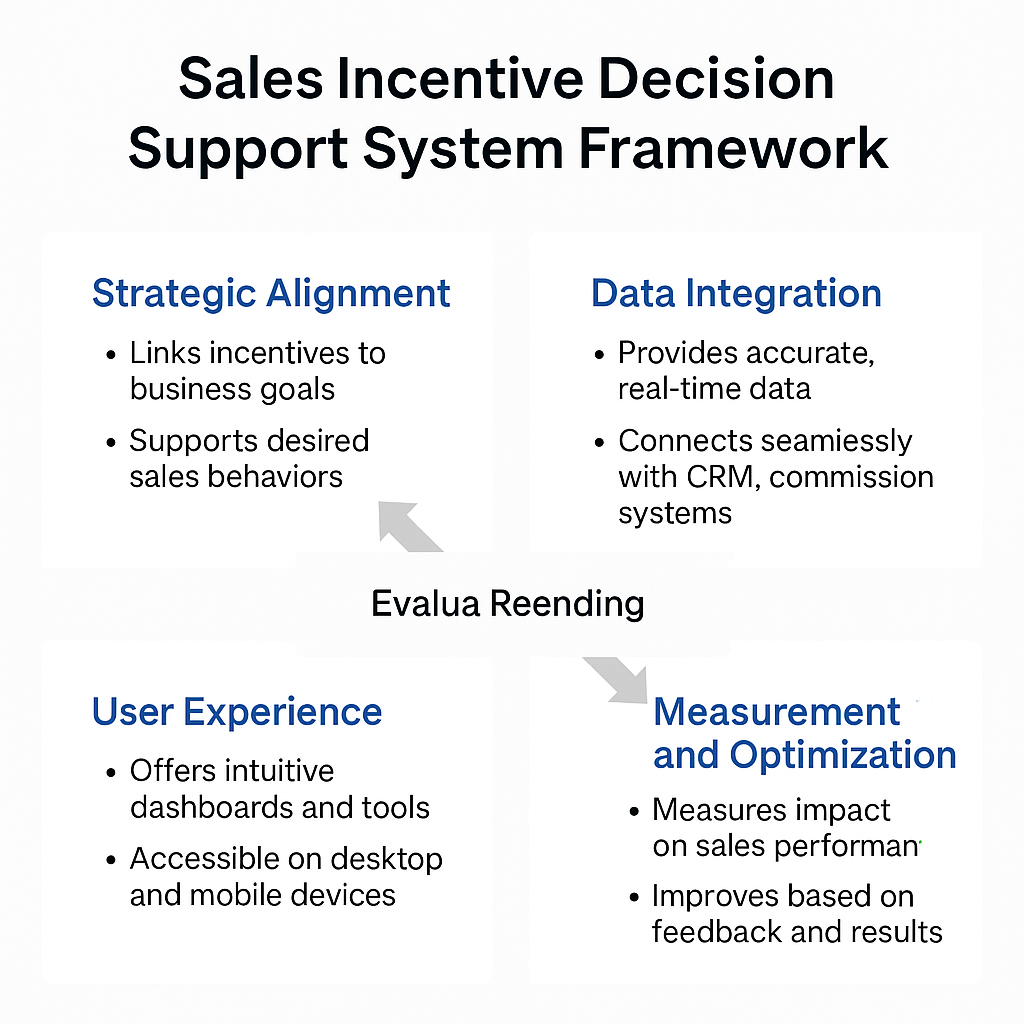Sales compensation plans set the expectations that drive behavior. Well-designed plans protect margin, align revenue teams to strategy and motivate high performance. But too...
Why Sales Operations Teams Must Provide Decision Support Systems for Incentive Plan Success in the Field
Organizations use incentive programs as powerful tools to guide sales teams towards achieving revenue targets. The best incentive structures will fail to drive sales performance if they remain misunderstood or untrusted by field sales teams who find them difficult to execute. The need for a Sales Incentive Decision Support System (DSS) becomes essential at this stage. Sales Operations teams must treat the adoption of a robust decision support framework as a strategic necessity because it has moved beyond being optional.
There exists a disconnect between incentive plan design and field execution that many organizations face.
Sales Operations teams in many organizations dedicate significant time and resources toward developing incentive compensation plans that align with corporate goals, existing market conditions and performance benchmarks. Although substantial efforts go into planning compensation and performance metrics there remains a persistent gap between strategic design and practical field application.
Salespeople frequently struggle to understand:
1. How their quotas are calculated
2. What behaviors are being rewarded
3. How they can optimize their earnings
4. How their performance tracks toward incentives
When salespeople are confused about their compensation plans they may become disengaged and the organization may miss its revenue targets while losing top sales talent through attrition. A Sales Incentive Decision Support System closes this gap by delivering transparent and actionable plans that salespeople can access at any time.
How does a Sales Incentive Decision Support System operate?
Salespeople and frontline managers use Decision Support Systems (DSS) to make informed incentive plan decisions with the help of technology-enabled platforms or processes. It provides:
1. Real-time insights into earnings potential
2. Visibility into quota attainment and performance metrics
3. The system includes scenario planning tools which allow users to test hypothetical earning outcomes.
4. Notifications about potential risks and likely opportunities for achieving sales incentives
The platform helps salespeople identify the best areas to concentrate their efforts for better payout results.
A DSS converts fixed compensation structures into active performance management systems.
The role of Sales Operations Teams should include advocating for the implementation of Decision Support Systems.
1. Empowering Sales Teams with Real-Time Intelligence
Modern sales environments move fast. When sales representatives must wait until the quarter’s end to learn about their earnings and bonus-affecting deals they become demotivated and overlook potential sales opportunities. A DSS offers:
Example: A tech firm launched a DSS which provided sales representatives with daily reports on their quota achievements, future commission potential through pipeline stages, and detailed information about each deal. Sales representatives were able to focus on high-margin products since they observed earnings impact instantly. The initiative led to an average deal value increase of 15% during a span of two quarters.
2. Improving Trust and Transparency in Incentive Plans
Salespeople frequently disengage from compensation plans because they find them unclear and untrustworthy. DSS systems make complicated compensation structures clear while teaching representatives how the reward system functions.
Example: The financial services firm encountered persistent objections to their tiered bonus system. Sales Operations implemented a DSS that included integrated plan calculators and payout simulation tools. Sales representatives had the ability to simulate multiple sales scenarios and view their immediate bonus predictions. Customer complaints saw a 60% reduction while satisfaction scores among representatives increased substantially.
3. Driving the Right Sales Behaviors
Incentive programs should guide sales representative behavior to support the company’s strategic objectives. Without understanding the effect of their actions on their payouts sales reps are at risk of choosing incorrect deals or product lines. Salespeople use a DSS to understand how their work leads to results.
Example: The telecom firm used its Decision Support System to identify underpenetrated accounts which allowed reps to gain multipliers. Sales representatives who had ignored certain accounts before increased their activity by 30% and generated $5M in additional revenue.
4. Enabling Frontline Sales Managers to Coach Effectively
The primary responsibility of first-line managers includes motivating their sales teams while steering their performance in the right direction. A DSS allows them to:
Track sales representative performance through both key performance indicators and incentive assessments
a. Identify risks to incentive attainment
b. Coach reps using scenario modeling
c, Conduct proactive performance reviews
Example: The SaaS business implemented dashboards for managers to track which representatives faced the risk of not achieving their acceleration goals. The use of the DSS forecast tool in coaching sessions conducted by managers resulted in 20% more representatives meeting accelerator thresholds.
5. Reducing Manual Effort and Errors
A DSS automates information distribution while minimizing operational costs and mistakes that arise from incentive-related inbox questions such as “How was this calculated?”, “Why didn’t I earn my bonus?”, and “What’s the plan rule on that exception?”.
Example: The deployment of their DSS resulted in the global pharma company achieving a 70% decrease in compensation-related support tickets throughout their initial quarter.
Sales Operations should identify essential elements when selecting a Sales Incentive Decision Support System.
Sales Operations must verify that the implemented Sales Incentive Decision Support System contains essential components.
a. User-friendly dashboards for reps and managers
b. CRM and commission systems receive real-time data integration.
c. Scenario planning tools for forecasting earnings
d. Quota and performance visualizations
e. Gamification elements to drive engagement
The system should deliver warnings and prompts regarding areas where targets are not met or potential opportunities exist.
Field reps need mobile access to use the system while traveling.
Aligning DSS with Business Strategy
The effectiveness of a DSS depends on its proper alignment with business needs rather than only its technological sophistication. Sales Operations must ensure that the DSS:
1. Mirrors the strategic objectives of the business
2. Reflects accurate and timely data
3. Is communicated effectively across the sales organization
Is iteratively optimized based on user feedback
Sales Operations transforms the DSS into an integral sales ecosystem component while preventing it from becoming a neglected tool.
Conclusion
Within today’s dynamic selling landscape Sales Operations teams must extend their focus beyond creating incentive plans. Sales Operations teams need to take proactive steps to activate those plans throughout their field operations. Reps gain empowerment and trust through proper implementation of Sales Incentive Decision Support Systems which steer correct behavior and maximize incentive program ROI.
Incentive plans that lack decision support resemble maps missing a compass since both are good in theory but useless in execution.





